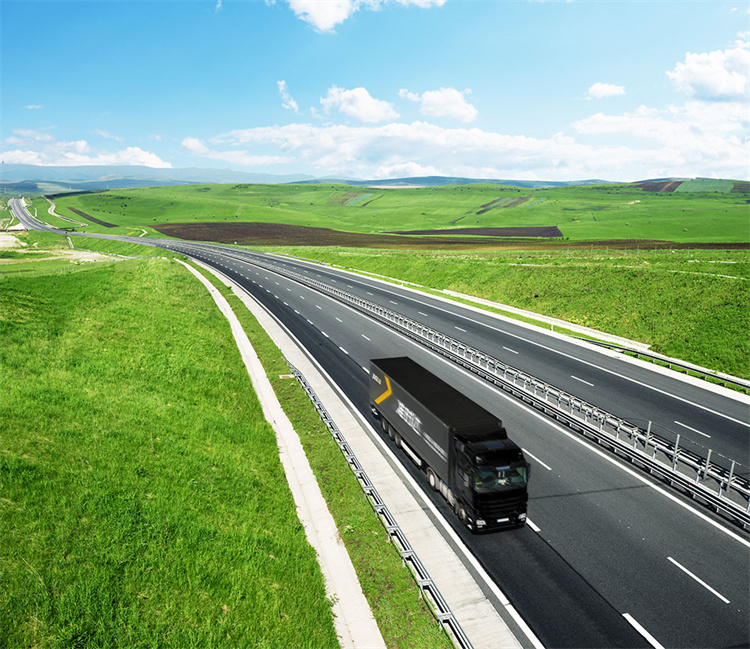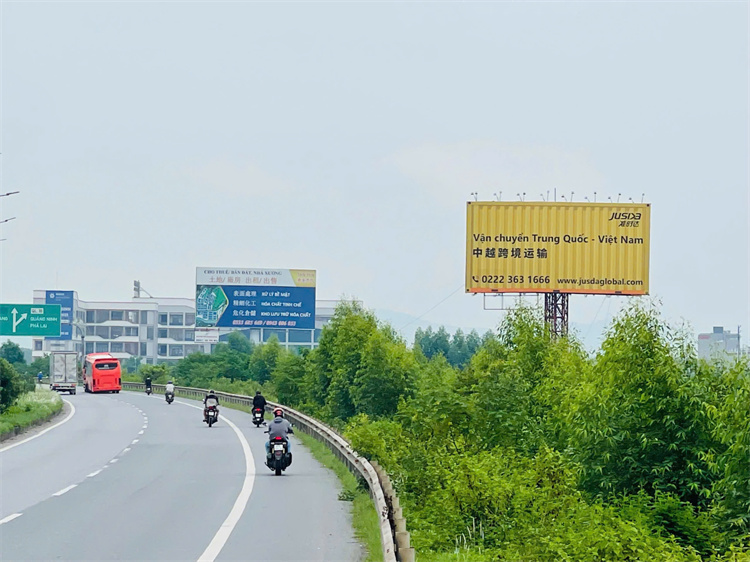Exploring Land Transport Solutions in Vietnam

Vietnam's economic growth has significantly impacted its logistics sector. In 2018, the sector grew by over 12 percent, reflecting its vital role in the economy. By 2023, logistics accounted for 4.92 percent of Vietnam's GDP. Efficient land transport solutions are crucial for sustaining this growth. They support economic development by enhancing connectivity and reducing costs. As Vietnam's GDP is projected to trend around 5.90 percent in 2025, the need for robust transport infrastructure becomes even more essential.
Macroeconomic Environment and Land Transport
Overview of Vietnam's Economic Growth
GDP Trends and Projections
Vietnam's economy has shown remarkable growth in recent years. In 2023, the GDP was estimated at approximately $433.3 billion, ranking fifth in Southeast Asia. By 2024, projections suggest a rise to $469.67 billion. The third quarter of 2024 witnessed the highest growth rate at 7.40%. These figures highlight Vietnam's robust economic trajectory.
Key Industries Driving Growth
Several industries fuel this economic expansion. Manufacturing, technology, and agriculture play pivotal roles. The electronics sector, in particular, has seen significant advancements, contributing to the overall GDP growth. These industries not only boost the economy but also create a demand for efficient logistics solutions.
Impact on the Logistics Sector
Demand for Improved Transport Infrastructure
The logistics sector in Vietnam is expanding rapidly. It aims for a 20% annual growth rate by 2025, potentially outpacing GDP growth. This surge necessitates enhanced transport infrastructure. Roads, railways, and waterways require upgrades to meet the increasing demands of goods and passenger transport.
Government Initiatives and Investments
The Vietnamese government actively invests in infrastructure projects. Road expansions and expressway developments are underway to improve connectivity. Public-private partnerships play a crucial role in these initiatives. These efforts aim to create a seamless transport network, supporting both domestic and international trade.
Investment Opportunities in Land Transport

Infrastructure Development Projects
Road and Highway Expansions
Vietnam's road and highway network is undergoing significant expansion. The government has prioritized these projects to enhance connectivity and support economic growth. By 2030, the aim is to develop a comprehensive transportation system that links major cities and industrial zones. This initiative not only facilitates trade but also reduces travel time and costs.
Public-Private Partnerships
Public-private partnerships (PPPs) play a crucial role in Vietnam's infrastructure development. These collaborations attract foreign investment and expertise, accelerating project completion. Through PPPs, Vietnam can leverage private sector innovation and efficiency, ensuring high-quality infrastructure. This approach has proven successful in various sectors, including transportation.
Emerging Technologies in Land Transport
Smart Transportation Systems
Smart transportation systems are transforming Vietnam's land transport landscape. These systems use technology to optimize traffic flow and improve safety. By integrating real-time data, they enhance decision-making for both authorities and commuters. Vietnam's commitment to smart transportation systems reflects its focus on modernizing infrastructure and boosting efficiency.
Electric and Autonomous Vehicles
The rise of electric and autonomous vehicles presents new opportunities in Vietnam. These technologies promise to reduce emissions and improve urban mobility. The government supports this shift through incentives and policies that encourage adoption. As a result, Vietnam is positioning itself as a leader in sustainable transportation solutions.
Challenges in the Land Transport Sector

Regulatory and Policy Barriers
Licensing and Compliance Issues
Vietnam's land transport sector faces significant regulatory challenges. Licensing and compliance issues often hinder efficient operations. The government has implemented procedures for licensing the transport of dangerous goods. These procedures include licensing, adjusting information, and re-issuing licenses. However, navigating these regulations can be complex for businesses. Understanding the Law on Road Traffic in Vietnam is crucial for organizations involved in road transport. This law regulates road traffic and applies to all related entities. Compliance with these regulations ensures safety and legal operation.
Import/Export Regulations
Import and export regulations also pose challenges. Vietnam's logistics industry must adhere to strict rules to facilitate trade. These regulations impact the movement of goods across borders. Businesses must understand the legal framework to avoid delays and penalties. The government aims to reduce logistics costs through infrastructure improvements. By enhancing transport infrastructure, Vietnam seeks to improve competitiveness and streamline trade processes.
Environmental and Social Concerns
Pollution and Sustainability
Environmental concerns play a critical role in Vietnam's transport sector. Pollution from vehicles contributes to greenhouse gas emissions. The government has set goals to reduce emissions and achieve net-zero targets. Promoting low-carbon transport solutions is essential for sustainability. Vietnam's Master Plan for Transportation Development 2021-2030 emphasizes green logistics. This plan focuses on reducing environmental impact and promoting sustainable practices.
Community Impact and Land Use
Land transport projects can significantly impact communities. Infrastructure development often requires land acquisition and changes in land use. These changes can affect local communities and ecosystems. Balancing economic growth with social responsibility is vital. The government must consider community impact when planning transport projects. Engaging with local stakeholders ensures that development aligns with community needs. Sustainable land use practices help mitigate negative effects on communities and the environment.
JUSDA's Role in Enhancing Land Transport Solutions
JUSDA's Comprehensive Services
JUSDA plays a pivotal role in enhancing land transport solutions in Vietnam. The company offers a robust road transport network and logistics solutions, which are essential for efficient movement of goods. With a focus on cross-border customs and truck services, JUSDA ensures seamless connectivity across regions. This comprehensive approach not only supports domestic logistics but also facilitates international trade.
Road Transport Network and Logistics Solutions
JUSDA's extensive road transport network covers key industrial zones and urban centers in Vietnam. This network enables timely delivery of goods, reducing transit times and costs. By leveraging advanced logistics solutions, JUSDA optimizes supply chain operations, ensuring that businesses can meet their logistical needs efficiently. The company's commitment to high-quality transportation services aligns with Vietnam's growing demand for professional logistics solutions.
Integration of IoT and Cloud Computing
JUSDA integrates IoT and cloud computing into its logistics operations, enhancing real-time data sharing and collaboration. This integration allows for better tracking and management of shipments, improving overall efficiency. By utilizing these technologies, JUSDA provides clients with greater visibility and control over their supply chains. This technological advancement positions JUSDA as a leader in modernizing Vietnam's logistics sector.

Industry-Specific Solutions
JUSDA tailors its services to meet the unique needs of various industries, including electronic manufacturing and fast-moving consumer goods (FMCG). These industry-specific solutions ensure that businesses receive customized support, enhancing their competitiveness in the market.
Tailored Services for Electronic Manufacturing and FMCG
For the electronic manufacturing sector, JUSDA offers specialized logistics solutions that cater to the industry's specific requirements. These services include precise inventory management and efficient order processing, which are crucial for maintaining production schedules. In the FMCG sector, JUSDA provides climate-controlled logistics to ensure the safe transport of perishable goods. This tailored approach helps businesses optimize their supply chains and reduce operational costs.
Support for Automotive and New Energy Sectors
JUSDA also supports the automotive and new energy sectors with innovative logistics solutions. The company offers comprehensive services that facilitate the movement of automotive parts and components, ensuring timely delivery to manufacturers. For the new energy sector, JUSDA provides logistics support that aligns with sustainable practices, promoting green logistics initiatives. This focus on sustainability reflects Vietnam's commitment to reducing the environmental impact of its logistics activities.
Regulatory Framework and Government Policies
Overview of Current Regulations
Transport Laws and Standards
Vietnam's transport sector operates under a comprehensive legal framework. Commercial Law 36/2005/QH11 and Decree No. 163/2017/ND-CP categorize logistics services and outline specific requirements for foreign investment. These laws ensure that logistics providers meet legal conditions regarding technical standards, safety criteria, and operational efficiency. The government enforces these regulations to maintain a high standard of service and safety in the transport sector.
Recent Policy Changes
Recent policy changes reflect Vietnam's commitment to improving its transport infrastructure. The government has introduced measures to streamline procedures and reduce bureaucratic hurdles. These changes aim to attract more foreign investment and enhance the efficiency of logistics operations. By simplifying regulations, Vietnam seeks to create a more favorable environment for businesses and investors.
Future Policy Directions
Planned Reforms and Initiatives
Vietnam plans to implement several reforms to boost its transport infrastructure. The government has high hopes for future opportunities for private investors to join transport infrastructure projects. Large-scale developments, such as expressway and highway projects, urban metro systems, and high-speed rail networks, present attractive investment prospects. These initiatives aim to modernize Vietnam's transport system and improve connectivity across the country.
Impact on Foreign Investment
The planned reforms and initiatives are expected to have a significant impact on foreign investment. By allowing Vietnamese and foreign organizations and individuals to invest in road infrastructure facilities, Vietnam opens up new opportunities for international collaboration. The continued growth and development of Vietnam's infrastructure system benefit from the contributions of foreign allies, the political system, and local communities. These efforts position Vietnam as a promising destination for investors seeking to capitalize on the country's expanding transport sector.
Practical Steps for Setting Up Operations
Navigating the Regulatory Landscape
Setting up operations in Vietnam requires a thorough understanding of the regulatory landscape. Businesses must secure key permits and approvals to ensure compliance with local laws. These permits include business registration, tax identification, and specific licenses related to the logistics sector. Companies should familiarize themselves with the Law on Road Traffic in Vietnam and other relevant regulations to avoid legal complications.
Working with local authorities is crucial for a smooth setup process. Establishing a positive relationship with government officials can facilitate the acquisition of necessary permits. Local authorities can provide valuable insights into regional regulations and offer guidance on compliance. Engaging with them early in the process helps businesses navigate bureaucratic hurdles efficiently.
Strategic Partnerships and Collaborations
Identifying potential partners is a vital step in establishing operations in Vietnam. Collaborating with local companies can provide access to established networks and market knowledge. Businesses should seek partners with complementary strengths and shared goals. This approach enhances operational efficiency and accelerates market entry.
Building successful joint ventures requires careful planning and negotiation. Companies must define clear objectives and roles for each partner. Open communication and mutual trust are essential for a thriving partnership. Joint ventures can leverage the expertise and resources of both parties, creating a competitive advantage in the Vietnamese market.
Mr. Jan Serger, an industry expert, emphasizes the importance of strategic expansion plans. He notes that exploring neighboring countries for expansion can offer additional growth opportunities. Businesses should consider regional dynamics and potential synergies when planning their expansion strategies.
Vietnam's land transport sector offers significant opportunities for investors. The development of robust transport infrastructure is crucial for sustained economic growth. Key insights include the importance of public-private partnerships (PPPs) in attracting investment and addressing legal barriers. Investors must prepare for infrastructure challenges and regulatory complexities. Success requires strategic planning and a thorough understanding of Vietnam's logistics landscape. Continued investment and planning are essential for achieving a modern and efficient transport system. Investors should explore these opportunities to capitalize on Vietnam's expanding transport sector.
See Also
Ready to Explore: The Latest in Transport Tech for Supply Chains
Budget-Friendly: Affordable Transportation Management Solutions
Revolutionizing Logistics: Exploring Future Tech Advancements
Redefining Efficiency: Innovating Indigenous Transport Solutions
Mastering Sustainable Transport in the Supply Chain Industry
